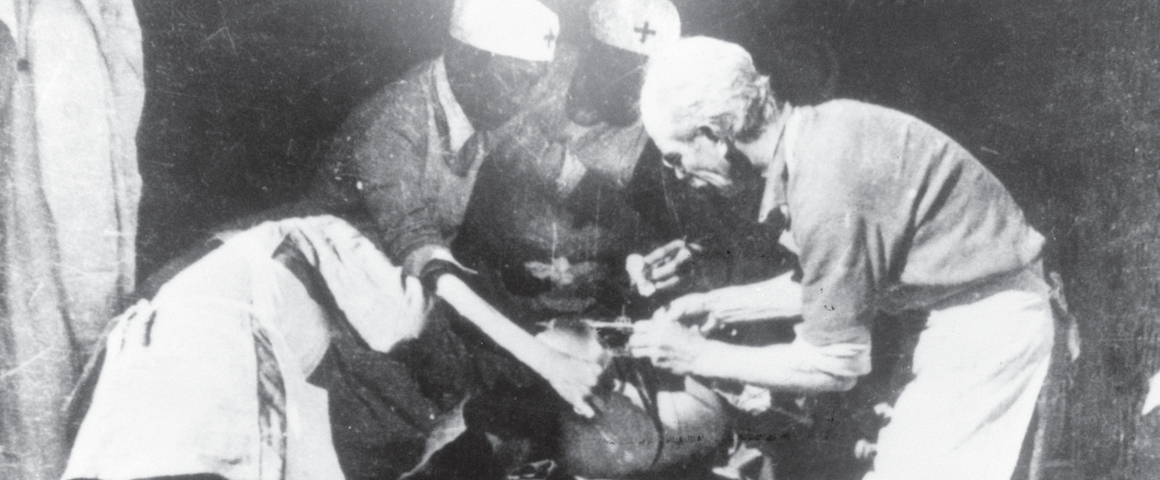Canadian media and politicians claim that this country’s public healthcare system is “what separates us from the Americans.” Social democrats have baptized Cooperative Commonwealth Federation (CCF)/ New Democratic Party (NDP) leader Tommy Douglas as the “Father of Medicare.” Election after election, opinion polls position healthcare as one of the key public concerns. Yet, for all this attention, the history of the struggle for socialized medicine in Canada remains poorly understood.
Douglas’ moniker is not an unfair one – without a doubt, he placed a high priority on creating universal provincial public healthcare when he was the CCF premier of Saskatchewan. He implemented key reforms and fought the medical establishment in Saskatchewan (and throughout North America) in 1962, paving the way for his successor, Woodrow Lloyd, to fully implement the universal healthcare program – the first in North America – which Douglas had introduced just prior to assuming federal leadership of the newly created NDP. Saskatchewan’s provincial system was used as the model for the Canada-wide health system created four years later by Lester Pearson’s Liberal government.
But leaving the story there – which far too many sources do – suggests that healthcare was designed and delivered to a passive population by a small handful of enlightened social reformers. Nothing could be further from reality.
For decades prior to Douglas’s government, workers and socialists had pressed for socialized medicine. This included communists who campaigned for healthcare at all levels – municipal, provincial and federal. A full three decades before the successful breakthrough in Saskatchewan, members of the Communist Party won a majority on the municipal council of Blairmore, Alberta where one of their key reforms was expanding the local public health service during the Great Depression.
The first motion for provincial healthcare in Manitoba was introduced in the legislature by James Litterick who was elected for the Communist Party in 1936. The motion was defeated, but reflected the growing demand among the working class. The first legislation for a cross-Canada healthcare system was introduced in the federal legislature by Fred Rose, a Communist Party member who was elected for the Labor-Progressive Party in 1941 and re-elected in 1943.
The communist who is best known for championing healthcare is Norman Bethune. His commitments to medicine and socialism eventually led him to the Spanish Civil War where he developed the mobile blood transfusion unit with the International Brigades and to the struggle against fascism in China where he trained and led volunteer medics in the Chinese Communist Party’s “guerrilla medical service” and saved tens of thousands of lives.
Following medical school, Bethune established his first practice in Detroit in 1924. His office was located among the city’s working poor and he quickly encountered the restriction and misery that is the sad accompaniment to the affluence of capitalism. He commented that practicing medicine in the midst of the shabby housing, poverty and sickness was “like putting a mustard plaster on a wooden leg.”
By the time he returned to Montreal in 1928, Bethune was full of anger at the class-based realities of healthcare and grappling with the contradiction between, on the one hand, the capacity of modern medicine to cure sickness and, on the other, the unwillingness of modern capitalist society to facilitate the universal provision of that care. He was increasingly drawn to radical political pamphlets and newspapers in an effort to explore and understand this connection. It led him to the Soviet Union in 1935 where he learned that healthcare was provided free of charge, as a constitutional right, in well-furnished facilities.
Inspired by the Soviet experience, Bethune joined the Communist Party of Canada and organized the “Montreal Group for the Security of the People’s Health.” This group of doctors, nurses and social workers met regularly well into 1936 to plan a socialized medical system for Canada.
Leading up to the Quebec provincial election in 1936, the Group prepared a detailed set of proposals for a socialized provincial medical system and released a manifesto on the eve of the vote. As part of their preparatory work, they helped to establish a Montreal-wide scheme of medical care for people on relief. This municipal effort and the pre-election work brought a large part of the population into action on the issue of socialized medicine. In addition, much of the logistical and administrative details pertaining to a socialized medical system were worked out and these provided some of the groundwork for the introduction of universal public healthcare across Canada years later.
Central to the Communist Party’s work on healthcare has always been its understanding that it is the masses who make change. Notwithstanding the importance of political leadership, without strong organizations of workers, farmers, health professionals and intellectuals, the dream of socialized medicine would have been just that and nothing more. In the current context of neoliberal cutbacks and privatization, the struggle to defend and expand healthcare requires the same degree of militant mass mobilization.
Informed by the work of its earliest members and driven by the needs of the working class and the dynamics of capitalist society, the Communist Party of Canada has continued to be a key voice for defending and expanding healthcare. This is reflected in the current push for universal pharmacare that includes a nationalized pharmaceutical industry and for publicly owned and operated long-term care to be provided through healthcare – demands that have become urgent during the coronavirus pandemic.
The struggle for socialized medicine and healthcare is one of the clearest examples of how the history of the Communist Party is intertwined with that of the labour and people’s movements. Based on this fact alone, the Party’s centenary is something for the whole working class to celebrate.
[hr gap=”10″]
Get People’s Voice delivered to your door or inbox!
If you found this article useful, please consider subscribing to People’s Voice.
We are 100% reader-supported, with no corporate or government funding.




